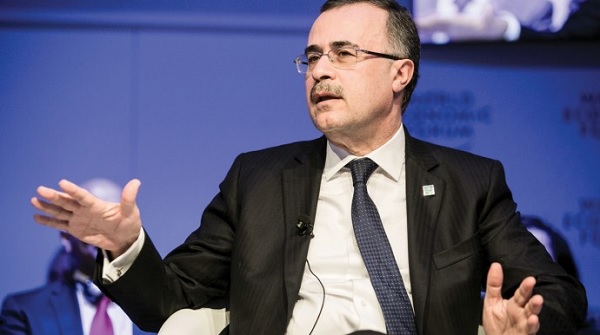
Amin Nasser outlines the future of energy at WEF 2017
DAVOS-KLOSTERS, Switzerland : At the World Economic Forum WEF 2017 Amin Nasser CEO, Saudi Aramco world’s leading oil and gas company expressed his views about the future of sustainable energy and envision the role of oil and gas, which will continue to play a significant role in the future energy transition in decades to come.
Speaking under the theme “Strategic Update: The Future of Energy,” Nasser expressed his view about the global energy industry, which is undergoing a long-term transition brought by climatic change, technological advancements and government policies. There is a global transformation which is currently underway and is putting a lot of pressure on the petroleum industry. The impact on oil demand will be moderate and the oil and gas industry will need about USD 25 trillion investments in coming quarter century, the hydrocarbon resources will be for decades. There will be an expansion needed in the sector and will need lots of capital to meet demand predictions for 2040 and 2060.
Nasser also outlined several scenarios for the global energy market, concluding that renewable energy will not supplant oil and gas in the energy mix in the near future. He cited the current and projected level of market share for electric vehicles as an example of how the sector’s degree of penetration does not significantly threaten hydrocarbon resources in the near term. There are about 1.2 million electric vehicles worldwide out of a fleet of 1.2 billion and there will be approximately 150 million by 2040, but the fleet will have increased in number from 1.2 billion to 2 billion. So there is 8% market penetration in light vehicle industry and oil is not all focused on the light vehicle industry and some small part in power generation, but significantly on heavy trucks, aviation and ships, which account for about 30% of oil consumption. “So the question of renewables and the impact on hydrocarbon resources should not stop us from getting the right capital. Otherwise, there will be spikes in prices, and the global economy will be impacted as a result,” Nasser continued and also highlighted the competitive advantage of Saudi Arabia in terms of hydrocarbon geology and solar energy.
“At Saudi Aramco, we are building our capacity in petrochemicals, in lubes. As a company, we are also taking a strong position in solar,” said Nasser. “The Minister of Energy, Industry and Mineral Resources HE Khalid A. Al-Falih has just announced USD 50 billion of investment opportunities in renewables in Saudi Arabia, and Saudi Aramco as a company is taking a strong position on renewables as well.”
The WEF’s 47th annual meeting concluded on January 20 with 3,000 international participants with over 400 sessions to address strategies for greater social inclusion and human development.
The forum focused on four critical leadership challenges of 2017 i.e. Reimagining global cooperation, Revitalizing the global economy, Reforming capitalism and preparing for the “Fourth Industrial Revolution,” where various elements (such as supercomputing, robotics, artificial intelligence, big data, 3-D printing, and biotech) will be intimately linked with Saudi Aramco’s evolving operations.
